The History of Policing America
The History of Policing America
From Militias and Military to the Law Enforcement of Today
Laurence Armand French
ROWMAN & LITTLEFIELD
Lanham Boulder New York London
Published by Rowman & Littlefield
A wholly owned subsidiary of The Rowman & Littlefield Publishing Group, Inc.
4501 Forbes Boulevard, Suite 200, Lanham, Maryland 20706
www.rowman.com
Unit A, Whitacre Mews, 26-34 Stannary Street, London SE11 4AB
Copyright 2018 by Rowman & Littlefield
All rights reserved . No part of this book may be reproduced in any form or by any electronic or mechanical means, including information storage and retrieval systems, without written permission from the publisher, except by a reviewer who may quote passages in a review.
British Library Cataloguing in Publication Information Available
Library of Congress Cataloging-in-Publication Data
Names: French, Laurence, 1941 author.
Title: The History of Policing America : from militias and military to the law enforcement of today / Laurence Armand French.
Description: Lanham : Rowman & Littlefield, [2017] | Includes bibliographical references and index.
Identifiers: LCCN 2017040643 (print) | LCCN 2017051500 (ebook) | ISBN 9781538102046 (Electronic) | ISBN 9781538102039 (cloth : alk. paper)
Subjects: LCSH: Law enforcementUnited StatesHistory. | PoliceUnited StatesHistory.
Classification: LCC HV8138 (ebook) | LCC HV8138 .F734 2017 (print) | DDC 363.20973dc23
LC record available at https://lccn.loc.gov/2017040643
 The paper used in this publication meets the minimum requirements of American National Standard for Information SciencesPermanence of Paper for Printed Library Materials, ANSI/NISO Z39.48-1992.
The paper used in this publication meets the minimum requirements of American National Standard for Information SciencesPermanence of Paper for Printed Library Materials, ANSI/NISO Z39.48-1992.
Printed in the United States of America
To the vast majority of law enforcement personnel who diligently serve to protect the publics safety regardless of race, color, creed, age, or sex/gender The Good Cops.
I
Origins of U.S. Law Enforcement
Militias, Military, Marshals, and Sheriffs
Introduction
Colonial Roots in Policing America
Genesis of Status Acquisition and Military Status in Colonial New England
The 2016 presidential elections attest to the fact that America is as divided a society as it has been since the mid-nineteenth century and the War between the States (Civil War). Two hundred and forty years since its declaration of independence, the United States has yet to resolve its racial, sectarian, gender, and socioeconomic divides. Much of this divisiveness is rooted in its perception of social injustice, where the rich 1 percent get richer while the rest of the populaces quality of life seems to be in decline. Here, social justice is measured by the gap between ideal versus the actual implementation of constitutional guarantees. Both camps, right and left, claim they are championing the Bill of Rights (the first ten amendments to the Constitution enacted in 1791) in their interpretation of laws and other forms of social control, including police and military use of force, incarceration, and the death sentence. Even taking that as an ideal, the Bill of Rights, when initiated, had a very restrictive definition of what constitutes a citizens eligibility for these rights. Herein lies a major factor in the administration of justice, notably social justice. Judicial ideals are vested in laws and statutes constituting procedural or de jure justice while the actual administration of these laws constitutes distributive or de facto justice. The divide between procedural and distributive justice constitutes the social justice index , reflecting the difference between Americas judicial ideals and its actual practices. Much contention surrounds the interpretation of the Bill of Rights, which is vested in the federal court system, making presidential appointments (and Senate confirmation) to federal courts, notably the Supreme Court, the august body that interprets the United States Constitution, such an important matter in elections.
The Bill of Rights
First Amendment: Freedom of religion, speech, and the press; rights of assembly and petition. Provides and protects freedom of religion, speech, assembly, and the press.
Second Amendment: Right to bear arms. Allows and protects the right to bear (own) arms (guns).
Third Amendment: Housing of soldiers. Prevents the army from moving into your home.
Fourth Amendment: Search and arrest warrants. Prevents unlawful searches and seizures, meaning the government cannot search or take your property without good reason.
Fifth Amendment: Rights in criminal cases (right to remain silent). Guarantees due processes, requires proper indictments, and prevents you from being tried for the same crime twice.
Sixth Amendment: Right of a fair trial. Guarantees a speedy trial, allows the accused to confront witnesses, and requires you to have a lawyer.
Seventh Amendment: Rights in civil cases. Concerns common law and guarantees a trial by jury.
Eighth Amendment: Bails, fines, and punishment. Guarantees punishment will be fair and not cruel and very large fines will not be imposed.
Ninth Amendment: Rights retained by the people. Promises your rights will not be violated even if you dont know what they are.
Tenth Amendment: Powers retained by the states and the people. Declares that powers not held by the federal government belong to the states or to the people.
1. Library of Congress Cataloging In-Publication Data, U.S. Constitution Pocket Guide (2015), 2135
The social justice divide in contemporary America is reflected not only in the widening economic gap between the ultra-rich and the rest of the country, but is also reflected in the perception of unfair entitlements doled out along racial lines, leading to animosities between whites and minorities of color; the working and middle classes versus the extremely rich (1 percent); Christians versus other religions and/or nonbelieversall contributing to the current divisions fueling both White Right (alt-right nationalists and white supremacists) racist and anti-immigration fervor, at one end of the continuum, and the Black Lives Matter movement at the other end of this contentious divide. Ironically, Donald Trump, a billionaire who is clearly a member of the 1 percent club, was elected by many of those who fall into the have not economic category. And while the economy may have played a role in Trumps election, a racist, vitriol backlash to having a black president, Barack Obama, seems to be a major contributing factor in this divide. It is imperative to look at the original, colonial foundations of American justice in order to better understand how this situation has played out over 240 years.
The law and order issues plaguing America in the twenty-first century clearly have their roots in the unique Puritan society that emerged in the New England colonies. First and foremost is the concept of Manifest Destiny and its major tenet, the superiority of privileged whites. Americas sense of social justice, selective morality, and entitlement emanates from this theological foundation, most notably its decentralized law enforcement agencies; social status hierarchy; and double-standards of justice. While the Puritan influence was predominate in the New England colonies, the ideal of white supremacy extended to the Southern plantations as well. The American version of the Protestant ethos was also designed to distant itself from the British aristocracy with its lineage of privileged status. By subscribing to the Calvinistic concept of divine predestination, the thirteen British colonies saw the opportunity to grow its own aristocracy, based on wealth and, to a lesser degree, military status. Military status, in turn, justified the exploitation of Americas resources for their personal wealth, thus emerged Americas version of capitalism.
Next page
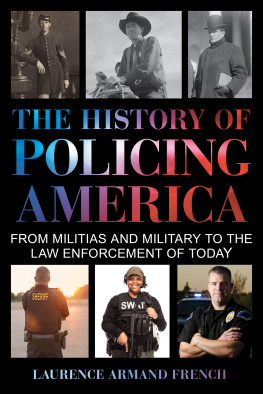

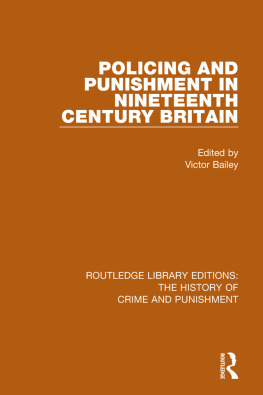
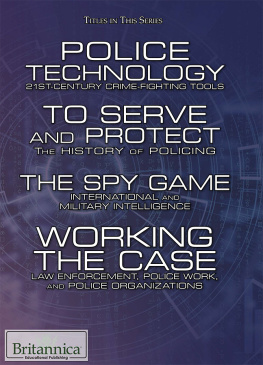
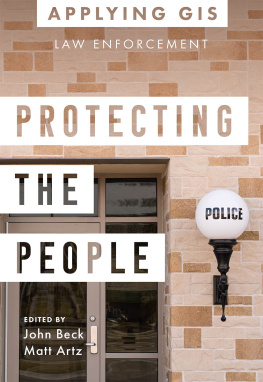
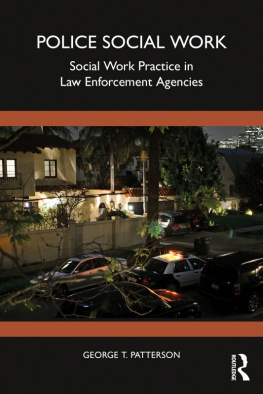
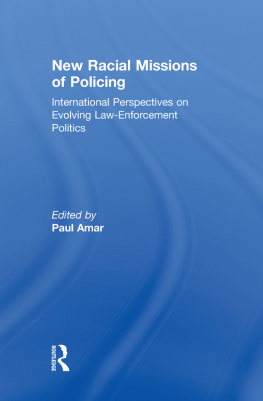

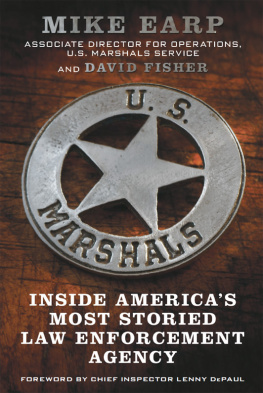
 The paper used in this publication meets the minimum requirements of American National Standard for Information SciencesPermanence of Paper for Printed Library Materials, ANSI/NISO Z39.48-1992.
The paper used in this publication meets the minimum requirements of American National Standard for Information SciencesPermanence of Paper for Printed Library Materials, ANSI/NISO Z39.48-1992.